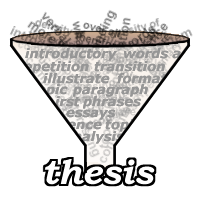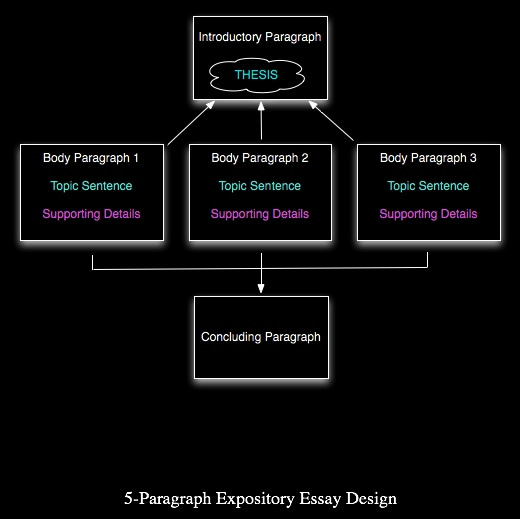|
Essays are generally categorized into three styles: the true narrative, the familiar, and the expository. What is an Expository Essay?
The expository essay is a genre of essay that requires the student to investigate an idea, evaluate evidence, expound on the idea, and set forth an argument concerning that idea in a clear and concise manner. This can be accomplished through comparison and contrast, definition, example, the analysis of cause and effect, etc. Please note: This genre is commonly assigned as a tool for classroom evaluation and is often found in various exam formats.
The structure of the expository essay is held together by the following: A clear, concise, and defined thesis statement that occurs in the first paragraph of the essay and is almost always the final sentence in the introductory paragraph. It is essential that this thesis statement be appropriately narrowed to follow the guidelines set forth in the assignment. If the student does not master this portion of the essay, it will be quite difficult to compose an effective or persuasive essay.
The thesis statement acts as a compass and if compose effectively the statement will inform the reader as well as remind the author what the essay is discussing. Another analogy which suits the understanding of how the introduction is compose is to think of the thesis as the spout of a funnel where information is passed smoothly, without creating a mess, to the reader.
Clear and logical transitions between the introduction, body, and conclusion: Transitions are the mortar that holds the foundation of the essay together. Without logical progression of thought, the reader is unable to follow the essay’s argument, and the structure will collapse. Well developed body paragraphs that include evidential support is the food for the reader. Each paragraph should be limited to the exposition of one general idea. This will allow for clarity and direction throughout the essay. What is more, such conciseness creates an ease of readability for one’s audience. It is important to note that each paragraph in the body of the essay must have some logical connection to the thesis statement in the opening paragraph. Evidential support (whether factual, logical, statistical, or anecdotal) is the substance of an effectively composed body paragraph. Often times, students are required to write expository essays with little or no preparation; therefore, such essays do not typically allow for a great deal of statistical or factual evidence.
A bit of creativity! Though creativity and artfulness are not always associated with essay writing, it is an art form nonetheless. Try not to get stuck on the formulaic nature of expository writing at the expense of writing something interesting. Remember, though you may not be crafting the next great novel, you are attempting to leave a lasting impression on the people evaluating your essay. A conclusion that does not simply restate the thesis, but readdresses it in light of the evidence provided. It is at this point of the essay that students will inevitably begin to struggle. This is the portion of the essay that will leave the most immediate impression on the mind of the reader. Therefore, it must be effective and logical. Do not introduce any new information into the conclusion; rather, synthesize and come to a conclusion concerning the information presented in the body of the essay. Using a final fact, quote or example in the conclusion often proves helpful in eliminating redundancy of expression–a common flaw in underdeveloped essays. The conclusion will end with your lesson of life statement, the one observation that you consider most vital for your reader. Essay Reminders (the familiar, the expository, the true narrative)
When writing:
♦ Know your purpose (determines what type of essay)
♦ Know your audience
♦ When applicable, be sure to understand the prompt
Whenever you write, regardless of the type of essay, certain standards hold true:
♦ A thesis
♦ Topic Sentence
♦ Express your opinion and support it
♦ Clarify
♦ Conclude
Good writers should not have a tug-a-war with structure and personal style (voice)
|
|


